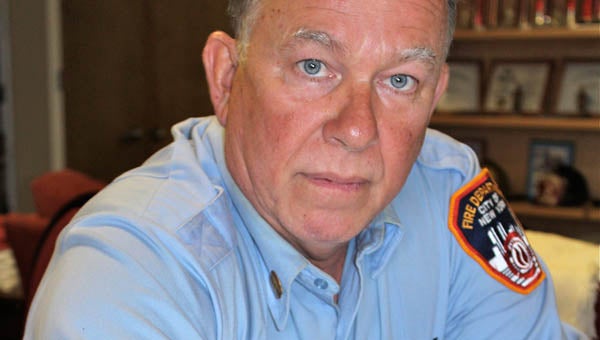Getting to know you … Steve Boehm
Published 11:30 pm Monday, September 29, 2014
Publisher’s note: We’d like to recognize those in our community who help make a difference in the quality of our lives. In that spirit we plan to regularly feature the men and women making a difference. To recommend someone be featured here please email us at: news@tryondailybulletin.com, with subject line: Getting to know you.
By Claire Sachse
Claire.sachse@tryondailybulletin.com
Thirteen years after the day that shook America to its core, retired New York City Firefighter and Fire Marshal Steve Boehm still cannot talk about the days, weeks and months following Sept. 11 without letting his mind drift away, his light blue eyes taking on the thousand yard stare of someone lost in memory.
Steve Boehm, a 20-year veteran of the FDNY in 2001, was off-duty that day from the fire station in Bushwick Brooklyn. When he heard the news reports, he quickly grabbed his gear. From his home in Long Island, he raced to the scene of the collapsed Trade Center in lower Manhattan to join his company from Squad 252.
Six members of his squad of brothers, as he called fellow firefighters from his station, had already died.
“When we got there,” said Boehm, “we didn’t find bodies. We found pieces of people, of helmets, of gear.” The hospitals and trauma centers, according to Boehm, were ready to handle the anticipated onslaught of wounded.
“There were none to take,” said Boehm.
“All the senior men were killed that day. We lost probies on up to the chief,” Boehm said. In total, the NYFD lost 343 firefighters, a number that Boehm memorializes in a tattoo on his right forearm. Due to the loss of so many senior firefighters, Boehm said that it took the department five to six years to recover.
For the first few days, the scene was chaotic. Civilians were on scene helping as best they could, Boehm said, and were helpful to the firefighters by providing food, gear, boots and tools. People showed up by the hundreds to help, said Boehm.
“It gave us a good feeling about America,” he said.
“For 12 – 16 hours at a time, we were digging and looking,” said Boehm. “Some of the guys slept in trucks,” he added. He noted that in the first few days, nobody had masks or respirators. Since that day, two of his friends have died due to lung problems.
“What were we gonna say?” he asked rhetorically, about not having the necessary equipment to maintain their own health. “We would have gone to hell to do what needed to be done. When everyone’s running out, we’re running in.”
Help poured in from fire departments across the country. One memorable gift was boots for search dogs, specially made to protect their paws from broken glass and sharp metal.
When President George Bush came to visit, Boehm said that the moment was very uplifting for him.
“He said we’d get through this, that we’d get the guys who did this, and we did,” said Boehm.
As the days of searching turned into weeks, the site shifted from that of a morgue to a construction zone, and the funerals began.
“Losing a fellow firefighter is like losing your own brother,” said Boehm. He attended funerals all over the state from Long Island to Brooklyn to Upstate New York.
“They just flowed for months and months,” he said, eyes drifting away to look out the window. He paused at length before adding, “They were family.”
Three years after Sept. 11, 2001, Boehm retired.
“A lot of us had to retire,” said Boehm. “It just wasn’t the same anymore.”
Today, Boehm and his wife live near Landrum on a farm with their horses. He enjoys the warmer weather of South Carolina, playing golf, riding his Harley-Davidson motorcycle and being involved with the Knights of Columbus. He is a member of St. John the Baptist Church in Tryon.
He has left the firefighting life behind, though, except for one day of the year, Sept. 11. He travels from Boiling Springs, to Landrum, to Clyde, N.C. to participate in memorial services held by those fire departments. At Landrum’s service, a piece of twisted steel from the towers was on display, and more than 100 white doves were released.
“People here appreciate having me there [at the services]. They appreciate having a piece of what was there,” said Boehm, referring to the steel I-beam.
“I’m someone who was there. When I give my speech, I want to say, ‘Don’t dwell, but also don’t forget what happened that day.’”






